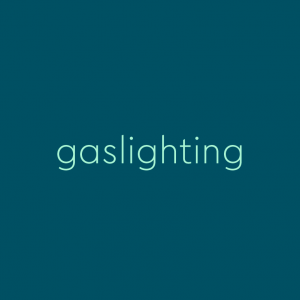Pop Culture dictionary
gaslighting
[ gas-lahy-ting ]
What does gaslighting mean?
Gaslighting is the act of distorting the truth in a way that’s intended to make another person accept the deception due to doubting their own memory, reality, or sanity. It’s considered a form of psychological manipulation or emotional abuse.
The verb form is gaslight, as in Don’t try to gaslight me—I have proof of what you’ve done!
The term gaslighting is often applied in the context of emotionally abusive relationships, such as romantic relationships or among family members. It is also sometimes used in reference to manipulative deception in other contexts, such as by politicians.
When the deception of the person who is engaging in gaslighting is questioned, they often react by dismissing the accusation as a delusion, an emotional reaction, or an overreaction—thus conditioning the person to internalize those assessments. According to mental health professionals, those targeted with gaslighting may experience lowered emotional intelligence and self-esteem due to frequently second-guessing their own judgment and sanity.
In addition to its narrow use in reference to a specific pattern of manipulative and deceitful behavior, gaslighting is also sometimes used more broadly to refer to other different forms of deception, including propaganda, disinformation, and even basic lying.
Example: It can be hard to believe how people can fall prey to such deception, but gaslighting has a very powerful effect.
Where does gaslighting come from?

The word gaslighting (referring to the act or practice) comes from the verb gaslight. Both gaslighted and gaslit are used as the past tense of gaslight.
The verb gaslight comes from the 1938 play Gas Light by Patrick Hamilton, which also had two 1940s movie adaptations. In the story, a husband attempts to drive his wife insane by, among other things, dimming the gas lights in their house and claiming she is imagining it.
The first records of the use of the term gaslight in the context of psychology come from the early 1960s. By the 1990s, the term gaslight had gained more casual use outside of psychology, usually in the context of abusive relationships or political rhetoric.
Be cautious of these signs of gaslighting
Be wary of someone who:
- denies your memory of events, even when presented with proof
- reinterprets events to shift blame on you
- minimizes your concerns or feelings
- makes you question your own version of events
- lies blatantly
Gaslight and gaslighting gained more widespread, mainstream use in the later 2010s, when such terms were often applied by political commentators and critics to the rhetorical tactics of Donald Trump, both when he was a presidential candidate and during his presidency. Such criticisms often focused on Trump’s use of the term fake news to refer to established facts as a way of presenting a false narrative to the American public.
This frequent use of gaslighting in reference to Trump likely played a role in the broader, more general use of gaslighting to refer to other forms of deception. Some people object to this broader use, especially when gaslighting is used in place of simpler terms, such as lying.
The term gaslighting was commonly used by the media during the Trump presidency and was used by the US government to describe Russia’s propaganda and disinformation strategy during Russia’s 2022 invasion of Ukraine.
Gaslighting examples
Who uses gaslighting?
Gaslighting is commonly used to refer to a specific pattern of manipulative behavior intended to get someone to accept deception due to questioning their own sense of reality.
"Gaslighting is a communication technique in which someone causes you to question your own version of past events.
Most times, it’s meant to make you feel like you’re losing your grip on reality.
At its worst, gaslighting can
be a form of mind-control & psychological abuse."— Muna AbuSulayman منى (@abusulayman) March 12, 2022
The term has also come to be used more broadly to refer to other kinds of deceptive or dishonest behavior.
why is spotify gaslighting me into thinking i don’t know my own password
— maeve👒 (@taylorismother) March 8, 2022
autocorrect insists on gaslighting me about the word “were.”
— Kyle Kinane (SOCAL Irvine 4/24, Oxnard 4/25) (@kylekinane) October 31, 2021
love showing paddy the treat bag then actually giving him sliced carrot. gaslighting my dog
— 🗯️ (@dhamp1rs) March 12, 2022
Note
This is not meant to be a formal definition of gaslighting like most terms we define on Dictionary.com, but is rather an informal word summary that hopefully touches upon the key aspects of the meaning and usage of gaslighting that will help our users expand their word mastery.